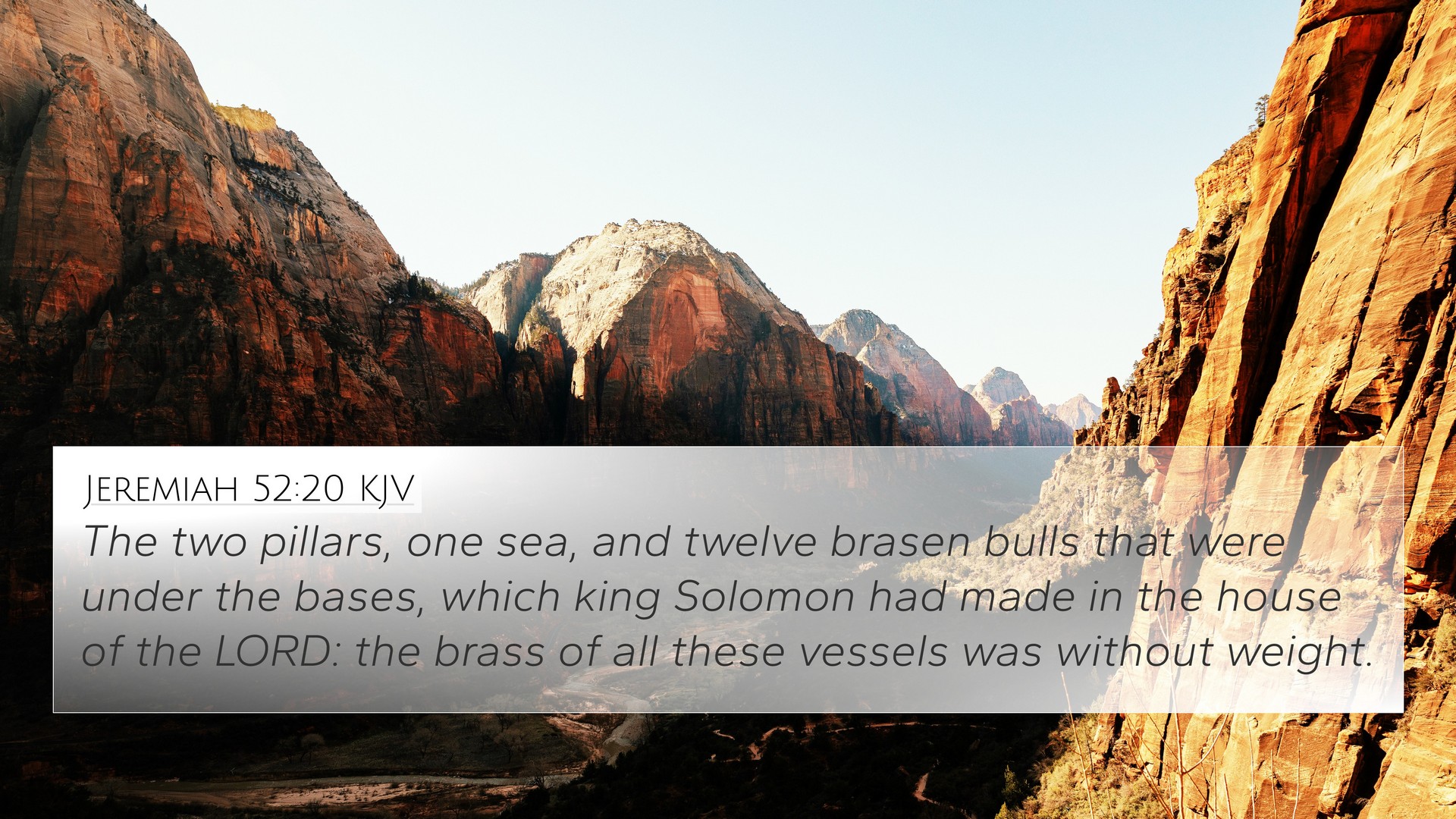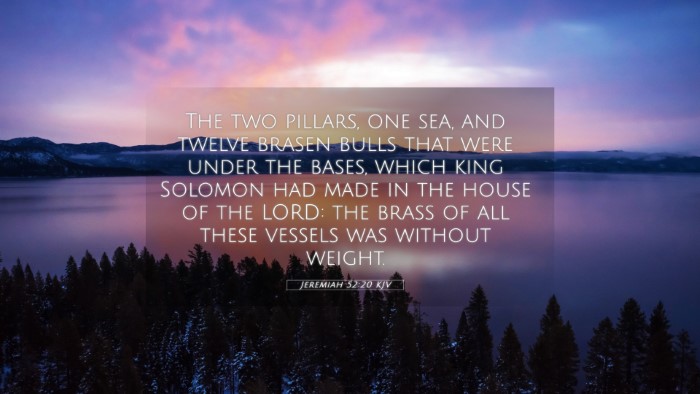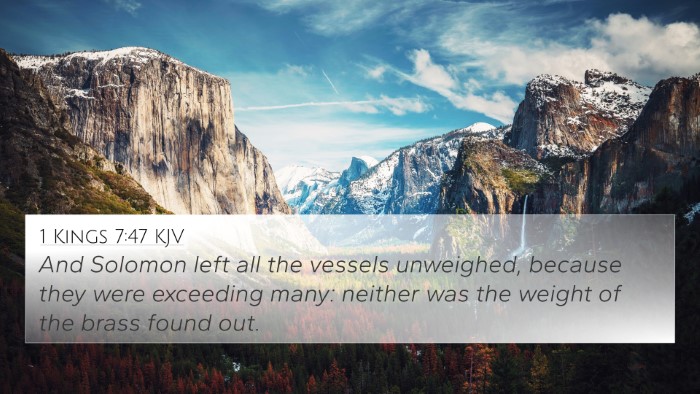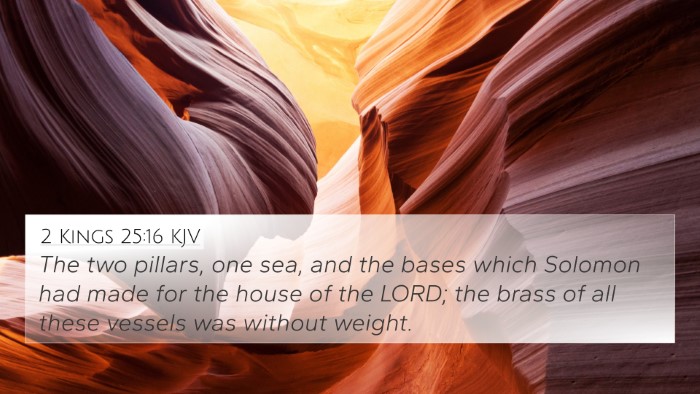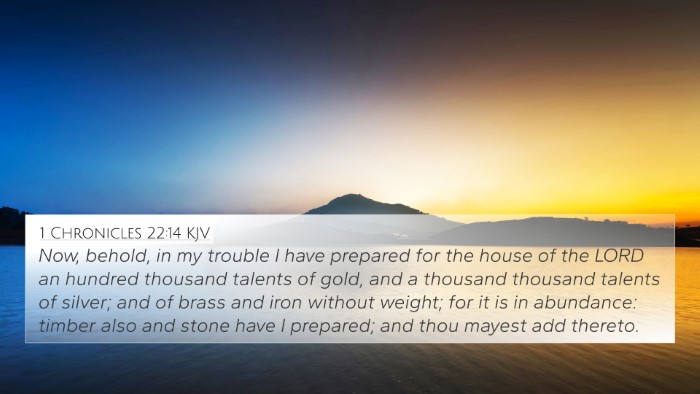Understanding Jeremiah 52:20
Jeremiah 52:20 states: "And the two pillars, one sea, and the twelve brasen oxen that were under the bases, which king Solomon had made in the house of the LORD; the brass of all these vessels was without weight."
Summary of Biblical Meaning
This verse describes the physical remnants of Solomon's grand temple, emphasizing the materials used, particularly brass and its quality, that was beyond measure. The significance of these items extends beyond their physical attributes, delving into the themes of divine glory, human craftsmanship, and the historical context of Judah's decline.
Commentary Insights
-
Matthew Henry: Henry highlights the grandeur of Solomon’s temple, suggesting that these items represented the pinnacle of Israel's worship. He indicates that the loss of such a monument reflects a deeper spiritual loss, as it symbolizes Israel's relationship to God.
-
Albert Barnes: Barnes emphasizes the detail in the construction, noting that these vast amounts of brass were indicative of the temple's former glory and serve as a metaphor for the kingdom's decline. He reflects on the meaning of God’s presence in the temple, which was crucial for Israel's identity.
-
Adam Clarke: Clarke views the brass items as symbols of the covenant between God and Israel. He finds it significant that even the weight of the brass was indeterminate, mirroring the immeasurable wealth of God's grace and mercy toward His people.
Connections Between Bible Verses
Jeremiah 52:20 can be cross-referenced with several related scriptures that explore themes of divine habitation, the Israelite monarchy, and the enduring nature of God's promises. Below are notable cross-references linked to this verse:
- 1 Kings 7:15-22: Details the construction of the two pillars in the temple.
- 2 Chronicles 4:1: Discusses the crafting of the bronze basin known as The Sea.
- 1 Kings 10:14: Lists the wealth of King Solomon, illustrating his illustrious reign.
- Isaiah 64:11: Reflects on the destruction of sacred objects and the temple.
- Jeremiah 7:4: Warns against placing false security in the temple.
- Hebrews 9:24: Relates the earthly temple to the heavenly sanctuary.
- Matthew 23:38: Jesus speaks about the temple being left desolate, connecting the physical structure to spiritual abandonment.
Thematic Bible Verse Connections
The great themes embedded within Jeremiah 52:20 stand as significant throughout Scripture, linking together the narrative of hope, loss, and restoration of God's people. Each connection illuminates different aspects of the covenant relationship and prophetic witness within the Bible.
-
Bible verses that relate to worship:
- Psalms 84:1-2 - A longing for the presence of God in the sanctuary.
- Exodus 25:8 - God desires a dwelling place among His people.
-
Bible verses surrounding the themes of destruction and restoration:
- Lamentations 3:22-23 - Reminding us of God's mercies and faithfulness despite destruction.
- Ezekiel 37:21-22 - God promises to gather Israel back to their land.
-
Bible verses depicting the eternal covenant:
- Romans 11:26-27 - The eternal promise to Israel.
- Hebrews 13:20-21 - God’s everlasting covenant confirmed through Christ.
Tools for Bible Cross-Referencing
Identifying cross-references in the Bible can enrich your study and understanding. Below are some suggested tools and methods for effective cross-referencing:
- Bible concordances for in-depth study of keywords.
- Cross-reference Bible study guides to identify thematic connections.
- Using digital Bible applications that feature linked scriptures.
- Utilizing comparative Bible study methods to analyze parallel verses.
Conclusion
Jeremiah 52:20 serves as a poignant reminder of the splendor of Solomon's temple, against the backdrop of Israel's tragic history. Through comprehensive Bible cross-referencing, one can explore the theological implications tied to this verse, revealing a narrative that spans both Old and New Testaments. Understanding these connections not only deepens our insight into God’s covenant faithfulness but also enriches our spiritual lives.
